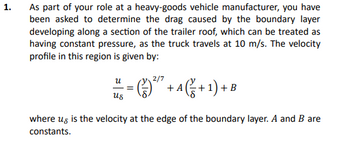Question

Transcribed Image Text:1.
As part of your role at a heavy-goods vehicle manufacturer, you have
been asked to determine the drag caused by the boundary layer
developing along a section of the trailer roof, which can be treated as
having constant pressure, as the truck travels at 10 m/s. The velocity
profile in this region is given by:
- A (+ 1) + 1
us
where us is the velocity at the edge of the boundary layer. A and B are
constants.

Transcribed Image Text:d) The trailer roof has width 2 m. Use the von Karman integral momentum
equation to determine the total drag contribution due to the boundary
layer between x = 0.1 m and 0.5 m. Assume p = 1.3 kg/m³.
Expert Solution
This question has been solved!
Explore an expertly crafted, step-by-step solution for a thorough understanding of key concepts.
Step by stepSolved in 2 steps

Knowledge Booster
Similar questions
- Pressure cookers have been around for more than 300 years, although their use has strongly declined in recent years (early models had a nasty habit of exploding). How much force (in N) must the latches holding the lid onto a pressure cooker be able to withstand if the circular lid is 23.0 cm in diameter and the gauge pressure inside is 3.50 atm? Neglect the weight of the lid. Narrow_forwardAn object hangs from a spring balance.The balance registers 32 N in air, 22 N when this object is immersed in water, and 27 N when the object is immersed in another liquid of unknown density. What is the density of that other liquid? Number i Units Varrow_forwardProblem6 When a viscous fluid flows parallel to a horizontal plate, it leads to the development of a thin boundary layer on the plate surface. The velocity within the boundary layer varies with the vertical direction as u(y) = US where 8(x) = 3.5 VX/Uis the boundary layer thickness vx 8(x) that increases with the horizontal position. Outside of the boundary layer, the flow is uniform and equal to the free stream velocity U... Show that for two fluids of different viscosities (₁, ₂) and densities (P₁, P2) and flowing at the same free stream velocity, the ratio of the drag force they generate on the plate is proportional to the square root of the ratio of the viscosities and densities: FD2 FD1 = H₂P2 M₁P₁arrow_forward
- Pressure cookers have been around for more than 300 years, although their use has strongly declined in recent years (early models had a nasty habit of exploding). How much force (in N) must the latches holding the lid onto a pressure cooker be able to withstand if the circular lid is 21.0 cm in diameter and the gauge pressure inside is 2.60 atm? Neglect the weight of the lid. Narrow_forwardQ6arrow_forwardConsider the following section of pipe. The velocity of water (Pwater h₁ m S V₁ = 2.9 h₁ = 3.2 m V₂ = 6.7 h₂ = 1.9 m m S Point 1 = 1000 kg ) and height are given for two different points in the pipe. Use this information to answer the following questions. m What is the ratio of the cross-sectional area at point 1 to the cross-sectional area at point 2? A₁ A₂ What is the difference in pressure between points 1 and 2? (Find P2 - P₁. Include a negative sign if that's what you calculate.) P2 - P1 = Pa Which direction is the water flowing through the pipe? Point 2 h₂arrow_forward
- The density of ice is 917 kg/m3, and the density of sea water is 1025 kg/m³. A swimming polar bear climbs onto a piece of floating ice that has a volume of 4.47 m3. What is the weight of the heaviest bear that the ice can support without sinking completely beneath the water? Number i Unitsarrow_forwardDrag Force: A spherical particle of radius 5.9 cm and a mass of 229 g is moving through a fluid of the same density. (This means you can ignore the effects of gravity.) 1 The position of the particle is given by x (t) = In (1+ bvot), where x is its position and t is the elapsed time. The initial speed vo is 17.4 m/s, and the constant b is 0.4 m-1. (b) What is the velocity of the particle after 2.9 seconds? (c) What is the acceleration of the particle after 2.9 seconds?arrow_forwardQ.5) On long strands form by cobwebs, water vapor condense at night to form long cylinders of water. The cylinders may collapse to form spherical droplets separated by a certain distance. Find the maximum distance (in mm) between droplets formed. Surface tension= α, radius of cylinder r = 2 mm. Iarrow_forward
- A vehicle windshield is to be shaped as a portion of a half-body with the dimensions shown in the figure below. For a free stream velocity of 65 mph, determine the velocity of the air at points (a) A and (b) B. Windshield U=65mph (a) VA= (b) VB= 2.0 ft i B 1.5 ft mph mpharrow_forwardPlease answer part d super fastarrow_forwardA highway curve is super elevated at 7deg. Find the radius of the curve if there is no lateral pressure on the wheels of a car at a speed of 40mph Select the correct response: 565.60m I don't have any answer 465.60m 265.60m 365.60m 165.60marrow_forward
arrow_back_ios
SEE MORE QUESTIONS
arrow_forward_ios